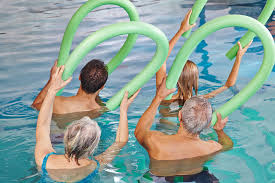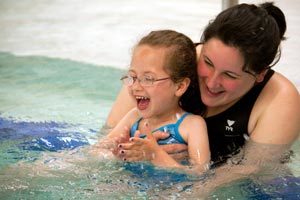 Swimming has already proven that it can be beneficial in helping you to stay in shape. What you may not think about too often is the fact that there are a lot of different things you can do in the water to make swimming even more effective. This also includes working out during the summer months, without going to the gym. Have you ever considered at home water therapy?
Swimming has already proven that it can be beneficial in helping you to stay in shape. What you may not think about too often is the fact that there are a lot of different things you can do in the water to make swimming even more effective. This also includes working out during the summer months, without going to the gym. Have you ever considered at home water therapy?
The Best Use for Water Therapy
One of the biggest things you can do while in a pool is rehabilitating muscles. The water is relaxing to muscles so that they do not feel the workout the way they normally would. This can allow them to stretch further, without increasing your pain. It also does not cause you to feel pain in your joints the way that you would if you were trying to compensate for sore muscles. In a swimming pool, it is impossible for you to jar your joints and muscles by walking, hopping, or doing any other movements that would normally aggravate further the aches and pains of a previous injury.
Other Uses
 Not only does water soothe the body, but it can soothe the mind. Therefore, there are some who feel that it may also be beneficial to children and adults who suffer from autism. It can help by giving a person with ASD better balance, more communication skills since small talk can happen easily in a pool, sensory improvement, improve oral motor skills, and best of all; improves their ability to swim. Can you imagine the person that you love being more able to blow out a birthday candle because they blow bubbles in the water, or feeling more because it awakens senses and calms at the same time? These same benefits can also help those who suffer with cerebral palsy and other medical issues. You can perhaps increase this “calmness” by putting them in a pool that is close to home and adding lights to it. They even have pool lights for above ground pools now, so that people can workout whenever it is best for them and enjoy a deeper relaxation.
Not only does water soothe the body, but it can soothe the mind. Therefore, there are some who feel that it may also be beneficial to children and adults who suffer from autism. It can help by giving a person with ASD better balance, more communication skills since small talk can happen easily in a pool, sensory improvement, improve oral motor skills, and best of all; improves their ability to swim. Can you imagine the person that you love being more able to blow out a birthday candle because they blow bubbles in the water, or feeling more because it awakens senses and calms at the same time? These same benefits can also help those who suffer with cerebral palsy and other medical issues. You can perhaps increase this “calmness” by putting them in a pool that is close to home and adding lights to it. They even have pool lights for above ground pools now, so that people can workout whenever it is best for them and enjoy a deeper relaxation.
Swimming Rocks
 Many parents do not want to have a pool because they are worried about their children getting hurt. However, for the autistic child, it can be beneficial to have a pool available to them. It gives them the chance to learn how to swim, which is great because many kids with ASD cannot express that they need help. By making aquatic therapy a part of their lives, you can work with them on how to communicate when they are in danger, while teaching them how to swim and lessen the risk. They can workout without feeling that you are pushing them to workout their muscles. The beauty of water is that most all kids will feel happier because they are swimming. If you have a child that rebels against being told let’s do this, chances are they will not be upset over a chance to play in the water. You simply have to stay close in case they get into trouble while trying to have fun.
Many parents do not want to have a pool because they are worried about their children getting hurt. However, for the autistic child, it can be beneficial to have a pool available to them. It gives them the chance to learn how to swim, which is great because many kids with ASD cannot express that they need help. By making aquatic therapy a part of their lives, you can work with them on how to communicate when they are in danger, while teaching them how to swim and lessen the risk. They can workout without feeling that you are pushing them to workout their muscles. The beauty of water is that most all kids will feel happier because they are swimming. If you have a child that rebels against being told let’s do this, chances are they will not be upset over a chance to play in the water. You simply have to stay close in case they get into trouble while trying to have fun.